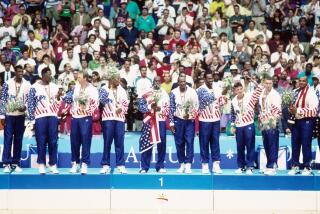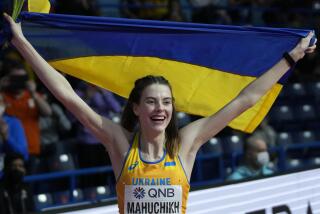For Athletes, ‘Brawn Drain’ Hard to Resist
- Share via
NOVOGORSK, U.S.S.R. — Sergei Basarevich proudly dons a Houston Rockets jersey during practice with the Soviet Olympic basketball team and dreams of playing in the NBA against Michael Jordan and Charles Barkley.
The dream is not so far-fetched for Basarevich, 26, the wiry point guard who will spearhead the Soviet team’s offense at the Summer Olympic Games in Barcelona. He faces tougher competition already in his daily life.
“In civilized countries this may be hard to understand, but in the Soviet Union we have problems with food, with surviving,” said Basarevich, who only recently moved from a tiny one-room apartment to a bigger, three-room place with his wife and 4-year-old daughter.
“Even compared to two years ago, it’s much worse,” he said.
Soviet athletes increasingly are finding it hard to compete for a country that can’t assure them a decent living.
In years past, some Soviet athletes defected to the West to earn a living. As barriers to emigration have loosened, more top competitors from soccer, hockey and other sports have opted to take the money and run, signing contracts to play in Europe and the United States.
It’s a buyer’s market for these transplanted stars -- and top coaches -- who often accept much less pay than their foreign colleagues.
As the Soviet Union struggles to avoid bankruptcy and survive the political breakup of its republics, there are few incentives for Soviet athletes to stay. Many athletes who seem to be resisting the “brawn drain” are merely waiting for the right contract.
“It’s hard even for me to make ends meet, and I’m considered a famous athlete,” said swimmer Dmitri Volkov, who won the bronze medal in the 100-meter breaststroke at the 1988 Seoul Olympics.
Volkov, 25, with a wife and two children, finds it insulting that he receives only 300 rubles a month from the Soviet government. Now even this meager income may be eliminated, since the government decided in December to abolish the State Sports Committee, or Gossport.
Volkov said he is “saved from poverty” only by winning cash prizes worth from $2,000 to $3,000 at international swim meets a few times a year.
Volkov, like Basarevich, plans to compete for the Soviets at the Summer Olympics in Barcelona. But after the Games, both stars expect to find work abroad. Basarevich is mulling an offer to play for a team in Greece, while Volkov is negotiating with a French professional swim club.
Basarevich said in an interview that circumstances have forced him to consider working abroad.
The Moscow Dynamo professional sports team for which Basarevich usually competes had not paid his salary for two months due to money troubles, he said in mid-November. He would not say how much he earns, but said it was a modest sum in rubles.
The Olympic basketball team pays his room and board at Novogorsk, a training camp in rolling, frost-covered fields near Moscow. But Basarevich said the cafeteria doesn’t serve decent meat anymore, so he and his teammates have started bringing their own lunches to practice.
Volkov, speaking at poolside during a training break at the Izmailovo Swim Center in Moscow, said the reforms of President Mikhail S. Gorbachev have abolished many privileges that athletes used to receive.
“Before, they would have given me a dacha, a nice car and other things; now they don’t,” Volkov said. “It is fairer now, but it is worse for me.”
Athletes still live better than average workers, said Basarevich, but he added that “now you can make more money in business as an entrepreneur.”
Both athletes said that their new right to go abroad and earn foreign currency is a major improvement over the past.
Besides the desire to make money, many Soviet sports stars say they must go abroad to develop as world class athletes.
“I want to play basketball on a high level,” said Basarevich, whose play-making and scoring took the Soviet national team to second place in last year’s World Championships. “But all the good competition is abroad,” he said.
For Basarevich, who picked up his Rockets jersey last summer when he played in a Texas college league, the final goal is clear.
“Playing in the NBA would be fantastic -- that’s the best basketball of all,” he said.
More to Read
Go beyond the scoreboard
Get the latest on L.A.'s teams in the daily Sports Report newsletter.
You may occasionally receive promotional content from the Los Angeles Times.






